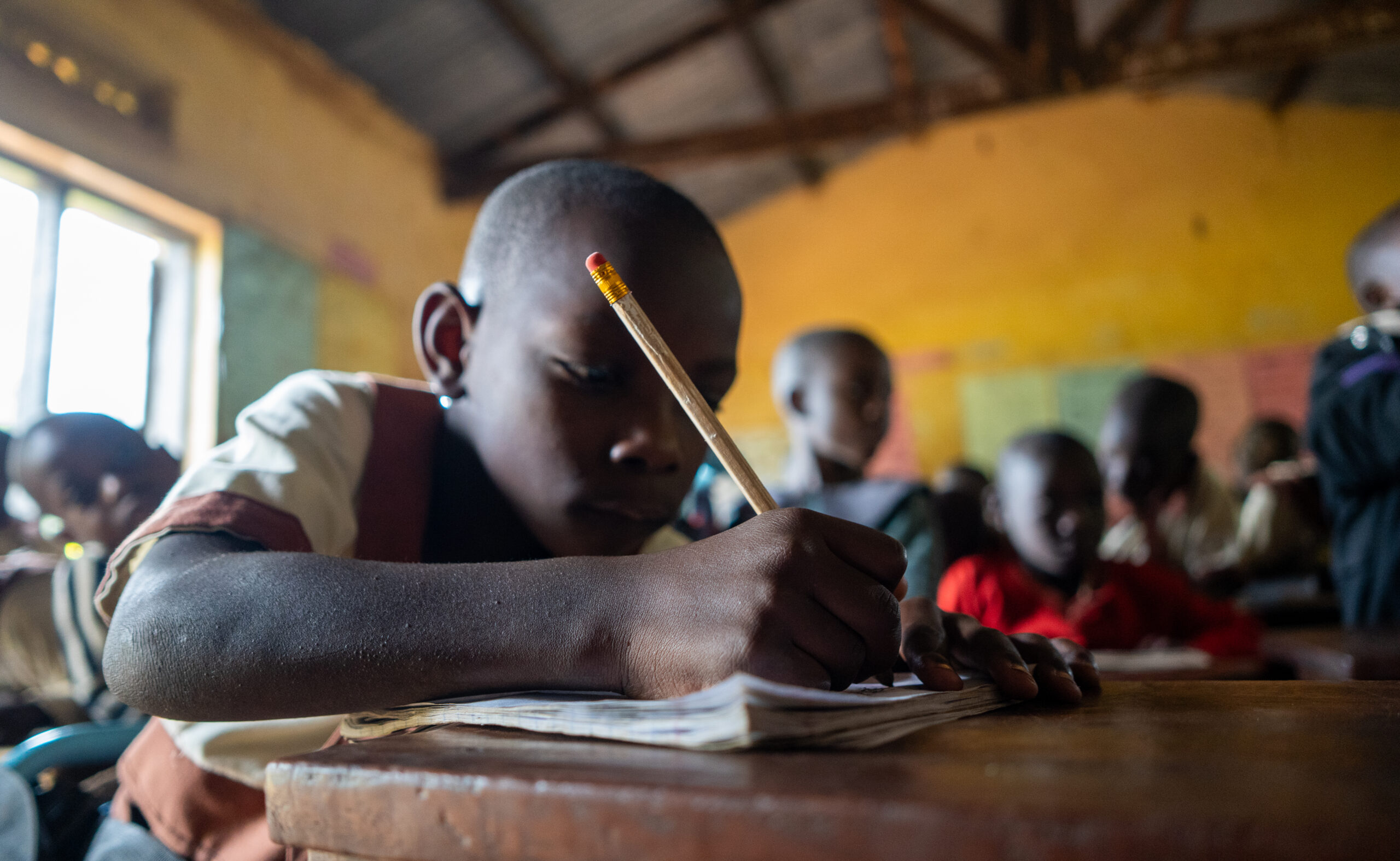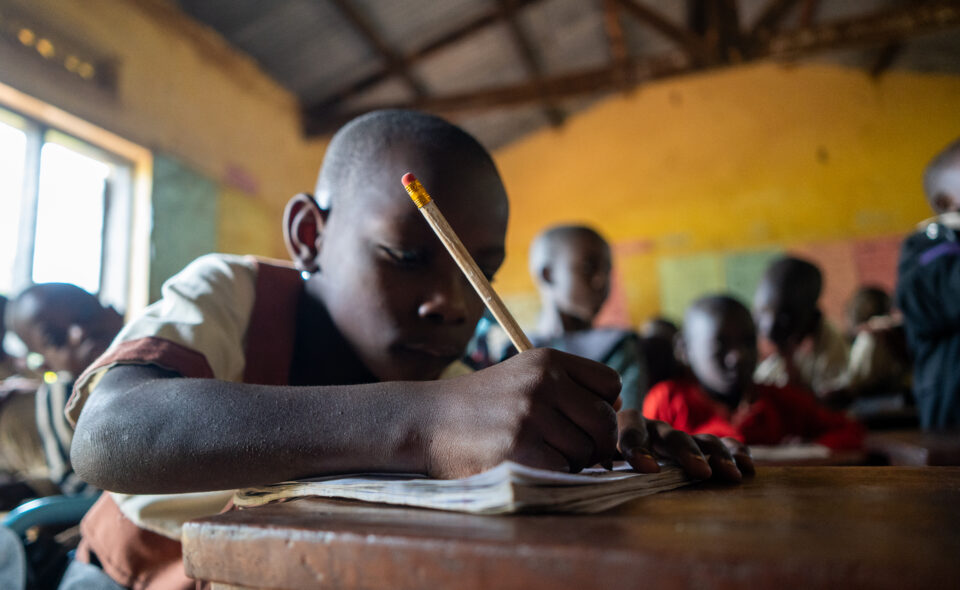
Immaculate in class, writing down an assignment from the blackboard at Kibanjwa Primary School in Hoima District, Western Uganda.
It is just before midday at Kibanjwa Primary School in Kayera Village of Hoima District, Western Uganda, and 9-year-old Immaculate Katusabe is carefully sounding out syllables during a literacy lesson. “Ba-na-na,” she reads slowly, her finger pointing to each syllable of the word. When she gets it right, a quiet smile spreads across her face. It may seem like a small victory, but for Immaculate, it means more: proof that she belongs in the classroom, reading and learning alongside her peers.
The path to this moment was not a straight one. Until recently, Immaculate had never seen the inside of a classroom. Born with a physical disability that affects her mobility, Immaculate spent her early years at home while her peers in Kayera Village went to school each day. Without a wheelchair to aid her, the dirt paths to school were impossible for Immaculate to navigate. Immaculate’s parents are subsistence farmers who work hard to provide for their family, but their income simply could not cover the cost of the wheelchair for their daughter. “We wanted her to go to school,” her father, Simon, explains. “But we didn’t know how to make it work. […] We couldn’t afford what she needed.” Despite staying home, Immaculate’s curiosity about learning never faded. She would listen when her father read aloud and try to copy letters she saw in old newspapers.
During a household visit to identify out-of-school children, Cohort 9 Building Tomorrow Fellow James Kashoborozi and Community Education Volunteer Harriet Kiiza learned of Immaculate’s predicament. For the next few weeks, James and Harriet collaborated with the community to secure a wheelchair for Immaculate. They were directed to Father’s Mobility Ministry, a local organization that provides assistive devices for children with disabilities. The team from Father’s Mobility Ministry worked with James to assess Immaculate’s needs and ultimately fitted her with a suitable wheelchair. With the assistance of the wheelchair, Immaculate would now be able to make her way to the school and attend her first day in the classroom!
STARTING FROM THE BEGINNING
When Immaculate arrived at Kibanjwa Primary School, she was eager to learn, but nervous. At nine years old, she knew she was starting her education journey much later than most children. To ensure she received the right support, James worked with the school to enroll her in Roots to Rise (R2R), Building Tomorrow’s remedial literacy and numeracy program designed to help children who need additional support to master foundational skills. Immaculate’s R2R-trained teacher, Kahwa Topista, assessed Immaculate’s learning level and found she could recognize some letters and single digits, in part due to her curiosity about reading and from watching her father read newspapers at home. She was thus placed in Level 1 of Roots to Rise.
Topista is a trained implementer of R2R and understands that inclusive education involves more than just providing physical access. “Immaculate was excited to finally be in school, but I could see she was also worried about being behind,” recalls Topista. “I assured her that we would start exactly where she was and build from there. That’s what R2R is designed for.” The R2R program groups learners by their current abilities rather than age, which meant Immaculate could learn alongside other children who were at similar skill levels without feeling embarrassed about her own level. During her 40-hour learning camp, she participated in numerous interactive activities, such as arranging letter cards to form words, practicing syllable sounds by clapping out rhythms, and gradually building her confidence through small, achievable steps.
Further, as an R2R-trained teacher, Topista understood that effective, inclusive education that builds foundational literacy and numeracy skills requires more than good intentions. It needs proven methods that can reach every learner, regardless of their ability. R2R integrates Universal Design for Learning (UDL) techniques, which means lessons are designed from the start to be accessible to children with different abilities, learning styles, and physical needs. For Immaculate, this meant using visual cues at her eye level, activities she could participate in from her wheelchair, and varied ways to demonstrate her understanding, whether through speaking, writing, or arranging materials on her desk. R2R also integrates a social-emotional learning component, which helped her to build confidence and feel valued as a learner, addressing the anxiety that came with starting school later than her peers. The comprehensive methodologies and inclusive pedagogies made R2R ideally suited to support Immaculate’s unique education journey as she gains foundational reading, writing, and math skills.
STEADY AND MEANINGFUL PROGRESS
After completing her R2R camp, Immaculate’s final assessment showed encouraging progress — she advanced from Level 1 to Level 2 in both literacy and numeracy. Most significantly for her literacy development, she could now read and understand simple sentences, a major leap from only recognizing individual letters. She had also mastered basic addition.
The academic progress tells only part of the story. Immaculate’s school attendance has become consistent, and she now actively participates in class discussions. Her confidence has grown as she realizes she can keep up with the material. She’s also made friends with her classmates, something that seemed so far away when she first came to school, when she worried about being viewed differently by her peers.
As we continue our celebration of International Literacy Day, we recognize that without literacy, children are cut off from the most basic tools for learning, work, and daily life, making it one of the most consequential factors in their future success. Immaculate’s progress reflects Building Tomorrow’s broader commitment to ensuring every child is literate and numerate. In 2025, Building Tomorrow has reached more than 341,000 children through R2R programming, including more than 2,800 learners with disabilities. The program has also successfully enrolled more than 1,400 children with disabilities this year, working to ensure literacy and numeracy for all children.
Behind each of these numbers is an individual story like Immaculate’s: children who might have been overlooked or left behind because of a disability, or slower learning pace, or merely slipping through the cracks, but are now developing the foundational skills they need to succeed thanks to Building Tomorrow. When children gain literacy and numeracy, they gain the ability to navigate school, access information, and make choices for themselves, all skills that tangibly change the course of their lives.


